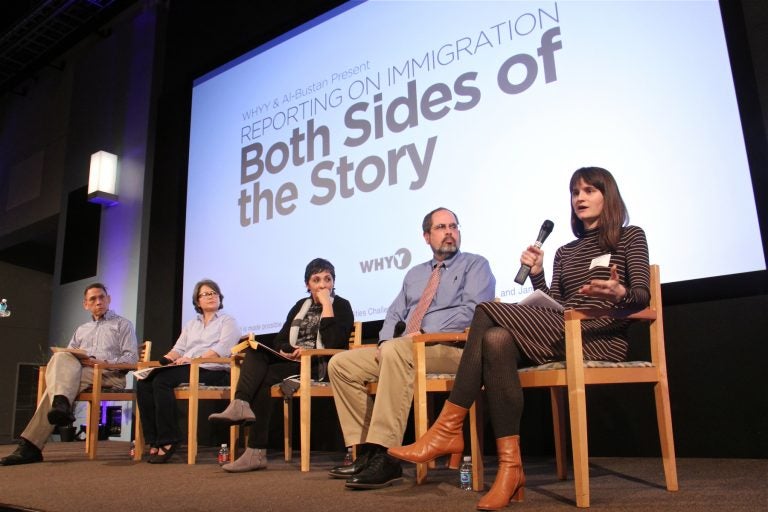‘I’ve lived it’: Examining how journalists report on the immigrant experience
A roundtable hosted by WHYY and Al-Bustan Seeds of Culture focused on immigration reporting at a time when political rhetoric on the issue is becoming increasingly divisive.

WHYY's Laura Benshoff (right) describes the obstacles she encounters while reporting on immigration during "Both Sides of the Story," a panel discussion on immigration reporting. She is joined by (from left) moderator Fernando Chang-Muy, a refugee law professor; freelance journalist Emma Restrepo; El Sol reporter Perla Lara; and Philadelphia Inquirer reporter Jeff Gammage. (Emma Lee/WHYY)
If you want to know the difference between how the media portrays the immigrant experience and what it’s like to actually be an immigrant, Shauna Small, who was born in Jamaica, puts it this way:
“This notion that people are coming to America for anything more than a better life for their children — and I might get emotional, because I’ve lived it — is insulting. Immigrants … come here for access to money to have a better life for themselves and their children. Mothers leave their children and come to a foreign country alone to work menial jobs because they want a better life. That is immigration. It is not an escaping of criminals. It is not rapists coming to a country to hide. It is seeking a better life in a world that so many times works against women. It is a mother and father wanting their child to be able to go to college so she can provide for herself and she in turn can provide for her own children. That is immigration, and the media does a piss-poor job of representing that.”
Small was speaking from the audience on Tuesday evening during a roundtable discussion hosted by WHYY and Al-Bustan Seeds of Culture to examine media coverage of immigrants at a time when political rhetoric around the issue is becoming increasingly divisive.
A panel of four journalists from across Philly media outlets grappled with the challenges of reporting on populations who are often overlooked.
Panelist Perla Lara, originally from Mexico, who writes for the newspaper El Sol, wants to see more nuanced reporting on the gamut of immigrant experiences.
“Immigrants, even though we suffer, there are a lot of cases where we do not suffer,” said Lara. “We have incredible stories. So sometimes we are too loud on the victimization and we need to show that we are more than victims.”
Ramses Montes, an attendee who was born in the Dominican Republic, critiques the timing of when immigration stories are newsworthy.
“Immigration only ever comes up when you’re trying to get a vote, when you’re trying to get something out of people,” Montes said.
Panelist Laura Benshoff, who covers immigration in Philadelphia and its suburbs for WHYY, voiced concern with how the reporters and the media are sometimes conflated with the opinions of the politicians they cover. Addressing the audience, she asked, “How can we report on public officials who may hold views that are biased against immigrants without perpetuating the stereotypes they are spreading?”
Attendee Rona Buchalter said she often struggles with journalists’ requests to interview people who are experiencing a vulnerable period of their lives. She directs the refugee resettlement program at HIAS Pennsylvania.
“It makes me uncomfortable to be asked to sort of trot out the most heartwarming, sad case we can find who’s willing to talk to the journalist. And I resist that a little,” she said. “At the same time I understand the need and the desire to hear those stories and make those stories known to the public.”
Panelist Jeff Gammage, with the Inquirer, admitted that he often has trouble accessing sources in immigrant communities, particularly if they are undocumented.
“I will offer degrees of anonymity,” he said. “But if at any point they want to back out, it’s OK. No news story is worth someone getting deported from this country.”
Panelist Emma Restrepo, a freelance journalist and radio host, talked about the importance of mainstream media taking notice of the issues of importance to immigrant communities. “So, like, the Berks Detention Center or the Conrail problem with opioid addiction — it was not a big deal when the Latino community covered it,” she said, “but when Philly.com and the Inquirer started to cover it, it was a huge deal. So, I think it’s important to connect journalists together like WHYY is doing here.”
WHYY is your source for fact-based, in-depth journalism and information. As a nonprofit organization, we rely on financial support from readers like you. Please give today.




